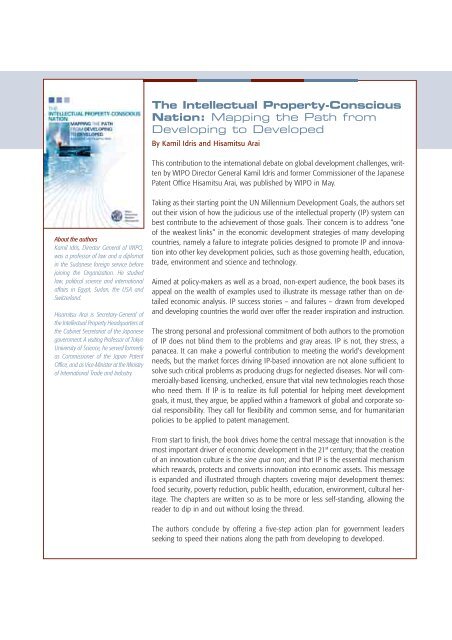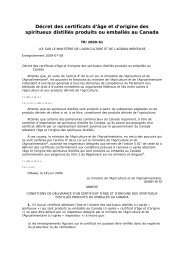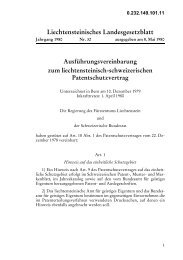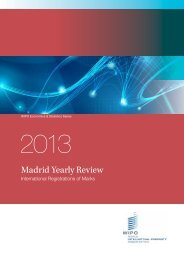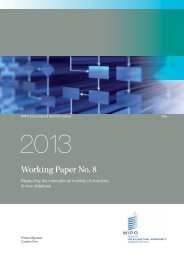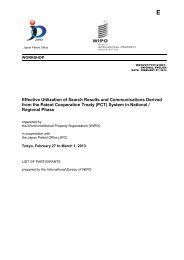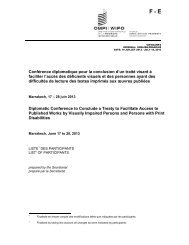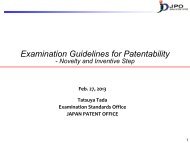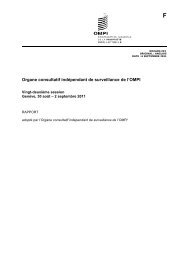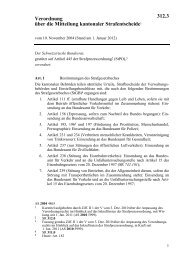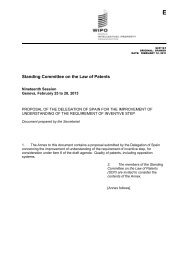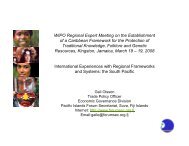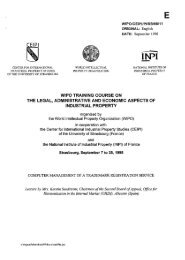the spirit of invention copyright in court world ip day round-up - WIPO
the spirit of invention copyright in court world ip day round-up - WIPO
the spirit of invention copyright in court world ip day round-up - WIPO
Create successful ePaper yourself
Turn your PDF publications into a flip-book with our unique Google optimized e-Paper software.
The Intellectual Property-Conscious<br />
Nation: Mapp<strong>in</strong>g <strong>the</strong> Path from<br />
Develop<strong>in</strong>g to Developed<br />
By Kamil Idris and Hisamitsu Arai<br />
This contribution to <strong>the</strong> <strong>in</strong>ternational debate on global development challenges, written<br />
by <strong>WIPO</strong> Director General Kamil Idris and former Commissioner <strong>of</strong> <strong>the</strong> Japanese<br />
Patent Office Hisamitsu Arai, was published by <strong>WIPO</strong> <strong>in</strong> May.<br />
About <strong>the</strong> authors<br />
Kamil Idris, Director General <strong>of</strong> <strong>WIPO</strong>,<br />
was a pr<strong>of</strong>essor <strong>of</strong> law and a d<strong>ip</strong>lomat<br />
<strong>in</strong> <strong>the</strong> Sudanese foreign service before<br />
jo<strong>in</strong><strong>in</strong>g <strong>the</strong> Organization. He studied<br />
law, political science and <strong>in</strong>ternational<br />
affairs <strong>in</strong> Egypt, Sudan, <strong>the</strong> USA and<br />
Switzerland.<br />
Hisamitsu Arai is Secretary-General <strong>of</strong><br />
<strong>the</strong> Intellectual Property Headquarters at<br />
<strong>the</strong> Cab<strong>in</strong>et Secretariat <strong>of</strong> <strong>the</strong> Japanese<br />
government. A visit<strong>in</strong>g Pr<strong>of</strong>essor <strong>of</strong> Tokyo<br />
University <strong>of</strong> Science, he served formerly<br />
as Commissioner <strong>of</strong> <strong>the</strong> Japan Patent<br />
Office, and as Vice-M<strong>in</strong>ister at <strong>the</strong> M<strong>in</strong>istry<br />
<strong>of</strong> International Trade and Industry.<br />
Tak<strong>in</strong>g as <strong>the</strong>ir start<strong>in</strong>g po<strong>in</strong>t <strong>the</strong> UN Millennium Development Goals, <strong>the</strong> authors set<br />
out <strong>the</strong>ir vision <strong>of</strong> how <strong>the</strong> judicious use <strong>of</strong> <strong>the</strong> <strong>in</strong>tellectual property (IP) system can<br />
best contribute to <strong>the</strong> achievement <strong>of</strong> those goals. Their concern is to address “one<br />
<strong>of</strong> <strong>the</strong> weakest l<strong>in</strong>ks” <strong>in</strong> <strong>the</strong> economic development strategies <strong>of</strong> many develop<strong>in</strong>g<br />
countries, namely a failure to <strong>in</strong>tegrate policies designed to promote IP and <strong>in</strong>novation<br />
<strong>in</strong>to o<strong>the</strong>r key development policies, such as those govern<strong>in</strong>g health, education,<br />
trade, environment and science and technology.<br />
Aimed at policy-makers as well as a broad, non-expert audience, <strong>the</strong> book bases its<br />
appeal on <strong>the</strong> wealth <strong>of</strong> examples used to illustrate its message ra<strong>the</strong>r than on detailed<br />
economic analysis. IP success stories – and failures – drawn from developed<br />
and develop<strong>in</strong>g countries <strong>the</strong> <strong>world</strong> over <strong>of</strong>fer <strong>the</strong> reader <strong>in</strong>spiration and <strong>in</strong>struction.<br />
The strong personal and pr<strong>of</strong>essional commitment <strong>of</strong> both authors to <strong>the</strong> promotion<br />
<strong>of</strong> IP does not bl<strong>in</strong>d <strong>the</strong>m to <strong>the</strong> problems and gray areas. IP is not, <strong>the</strong>y stress, a<br />
panacea. It can make a powerful contribution to meet<strong>in</strong>g <strong>the</strong> <strong>world</strong>’s development<br />
needs, but <strong>the</strong> market forces driv<strong>in</strong>g IP-based <strong>in</strong>novation are not alone sufficient to<br />
solve such critical problems as produc<strong>in</strong>g drugs for neglected diseases. Nor will commercially-based<br />
licens<strong>in</strong>g, unchecked, ensure that vital new technologies reach those<br />
who need <strong>the</strong>m. If IP is to realize its full potential for help<strong>in</strong>g meet development<br />
goals, it must, <strong>the</strong>y argue, be applied with<strong>in</strong> a framework <strong>of</strong> global and corporate social<br />
responsibility. They call for flexibility and common sense, and for humanitarian<br />
policies to be applied to patent management.<br />
From start to f<strong>in</strong>ish, <strong>the</strong> book drives home <strong>the</strong> central message that <strong>in</strong>novation is <strong>the</strong><br />
most important driver <strong>of</strong> economic development <strong>in</strong> <strong>the</strong> 21 st century; that <strong>the</strong> creation<br />
<strong>of</strong> an <strong>in</strong>novation culture is <strong>the</strong> s<strong>in</strong>e qua non; and that IP is <strong>the</strong> essential mechanism<br />
which rewards, protects and converts <strong>in</strong>novation <strong>in</strong>to economic assets. This message<br />
is expanded and illustrated through chapters cover<strong>in</strong>g major development <strong>the</strong>mes:<br />
food security, poverty reduction, public health, education, environment, cultural heritage.<br />
The chapters are written so as to be more or less self-stand<strong>in</strong>g, allow<strong>in</strong>g <strong>the</strong><br />
reader to d<strong>ip</strong> <strong>in</strong> and out without los<strong>in</strong>g <strong>the</strong> thread.<br />
The authors conclude by <strong>of</strong>fer<strong>in</strong>g a five-step action plan for government leaders<br />
seek<strong>in</strong>g to speed <strong>the</strong>ir nations along <strong>the</strong> path from develop<strong>in</strong>g to developed.


